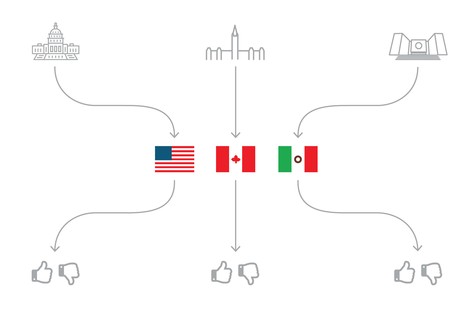Your podcast discovery platform
Curious minds select the most fascinating podcasts from around the world. Discover hand-piqd audio recommendations on your favorite topics.

piqer for: Globalization and politics Global finds
Luis BARRUETO is a journalist from Guatemala. Studied business and finance journalism at Aarhus University in Denmark and City University London.
NAFTA Is Up For Renegotiation – What Lies Ahead?
The North American Free Trade Agreement (NAFTA) will get a shake up soon. Donald Trump's administration unveiled its objectives in renegotiating the 23-year-old trade agreement (USTR). The process won't be easy, however, and Kim Soffen and Darla Cameron's graphic story is indeed a welcome guide – as renegotiations could start as early as August.
NAFTA is at the top of everyone's list of controversial trade deals: critics believe it is unfair and destroys jobs, while defenders praise its record of success in creating economic growth. President Trump, not least, deemed it the "worst trade deal maybe ever signed anywhere", and during the campaign trail pledged to scrap it. His most recent approach, Vox's Zeeshan Aleem writes, is thus surprising and a "document of compromise". He also says the most radical proposal seems mostly symbolic.
What lies ahead for the agreement?
Many of Trump's objectives bear close resemblance to provisions agreed by countries in the Trans-Pacific Partnership (TPP), which Trump scrapped on his first day in office (Quartz).
Similarities include toughening labor and environmental standards, as well as creating a mechanism to prevent countries from intervening in currency markets. This is a welcome improvement, but Trump's document also contains other measures aimed at giving the US increased leverage over trade fights, including doing away with an impartial dispute resolution mechanism in NAFTA.
Renegotiations can produce positive results, and agreements of this kind can always be modernized. But NAFTA can only be improved, several experts have argued, "if President Trump’s zero-sum 'America First' agenda is replaced by one that seeks to benefit all three countries and improve their competitiveness". Let's hope the balance tilts further in that direction.
